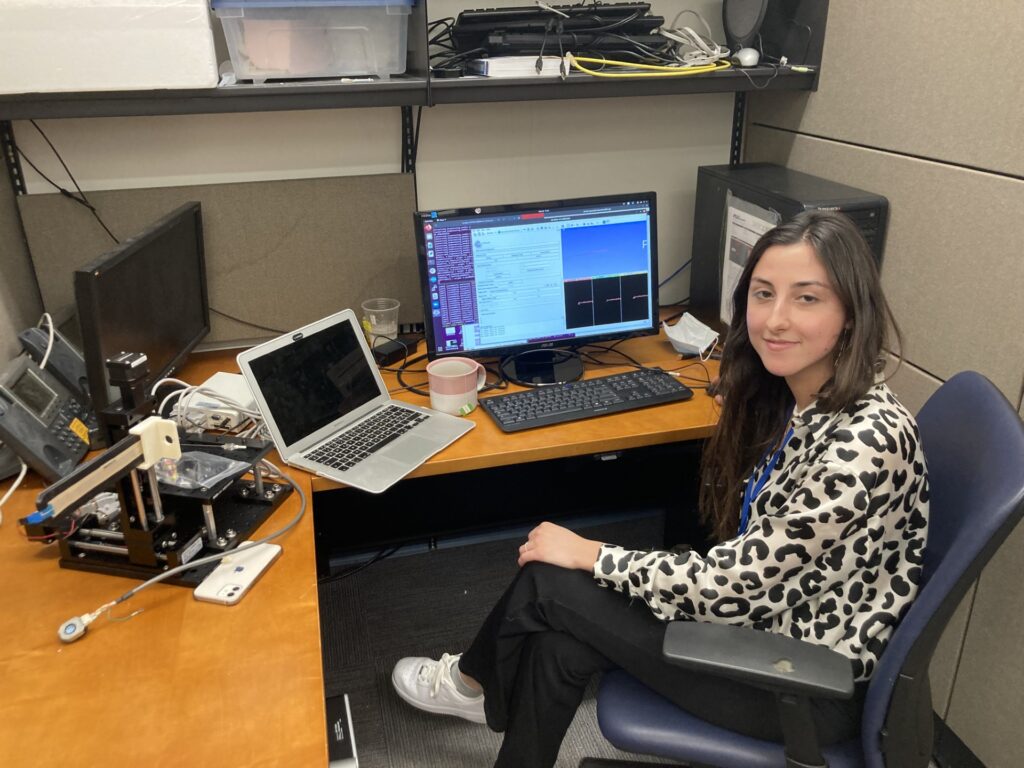
Training Tomorrow’s Innovators
(Photo: Lisa Marie Lou Mareschal, M.S. student in the lab from 2021–2022 and recipient of the NCCR Robotics MSc Thesis Award—an honor recognizing the top female master’s students in robotics in Switzerland.)
Foundations and Mentorship
The training philosophy of the Surgical Navigation and Robotics (SNR) Laboratory is grounded in the legacy of Drs. Ferenc Jolesz, Clare Tempany, and Ron Kikinis—mentors of lab director Dr. Nobuhiko Hata. Their influence established a culture of translational research and mentorship that continues to guide the lab’s mission: to train the next generation of innovators in image-guided therapy and medical device development.
Postdoctoral Training: A Core Focus in Career and Leadership Development
Postdoctoral fellows at SNR Lab receive comprehensive training that goes beyond scientific research. They are mentored in career development and leadership through structured training plans informed by resources from the Harvard Medical School Office for Postdoctoral Fellows, NIH-funded program project and training grant initiatives, and direct feedback from past and current fellows.
These plans are tailored to support each fellow’s long-term career goals, incorporating best practices from both academic and industry career development models. Trainees often maintain lasting relationships with the lab and the broader Harvard community, reconnecting through structured alumni gatherings and homecoming events held at major conferences.
Due to the nature of our training mission, we accept postdoctoral fellows on a rolling basis. However, we take time to carefully evaluate mutual fit—ensuring that both the candidate and the lab can benefit from a long-term, engaging relationship. Prospective fellows are encouraged to review the information on this page for guidance on how to prepare for joining the lab and to contact the lab director directly for further discussion.
“[SNR Lab is] interested in the essence of what makes someone tick as opposed to just their research capabilities.”
— Artur Banach, Graduate Student and Postdoctoral Fellow; currently at École Polytechnique Fédérale de Lausanne (EPFL), from his interview article.
Graduate Level Training for Aspiring Students
The lab provides structured research opportunities for students in high school, undergraduate, and master’s programs, with training durations ranging from 10-week summer internships to six-month MS thesis projects. Each student engages in an independent research effort, either as part of a funded project or a pilot study exploring new scientific directions. Students are expected to design or validate medical devices using tools they have not used before, follow hypothesis-driven research principles derived from biomedical science, and develop analytical strategies to evaluate their work. Depending on the program length, students summarize their work in presentations or short papers, following a “Zieger et al. Essentials of Writing Biomedical Research Papers. Second Edition .”
“This internship was a great experience for me. It helped me learn about how an effective work environment functions, and also was incredibly interesting and a unique experience to work with talented, hardworking, and successful individuals from all over the world.”
— Tim Minicozzi, The Rivers School, Weston, MA; currently enrolled at MIT
Junior Faculty Mentorship
SNR Lab also supports junior faculty in establishing their independent research programs by providing access to lab space and resources—primarily as a form of support, and occasionally through formal collaboration. For faculty members who have not previously trained in a U.S.-based research-intensive environment, the lab extends elements of its postdoctoral training program to bridge that gap. This includes guidance on leadership development, managing professional relationships with peers and collaborators, and securing NIH funding to launch and sustain their own laboratories. International visiting professors also get help to foster their local labs after returning to their home institutions.
“[The Lab] helped me secure internal research funding for my research. Through this process, I came to truly appreciate the structure of the U.S. research system and the strong, institution-wide support provided by the hospital.”
— Nobuyuki Nakajima, Staff Surgeon and Assistant Professor, Department of Neurosurgery, Tokyo Medical University, Tokyo, Japan. [from Japanese article]
Clinical Integration and Innovation Environment
A defining feature of SNR Lab’s training is its close integration with clinical practice. Trainees gain access to the Advanced Multimodality Image-Guided Operating (AMIGO) suite, an active clinical environment where they can conduct experiments, observe real procedures, and interact with clinicians. This unique exposure promotes understanding of user-centered design and iterative, agile development in real-world settings—key principles for successful medical device innovation.